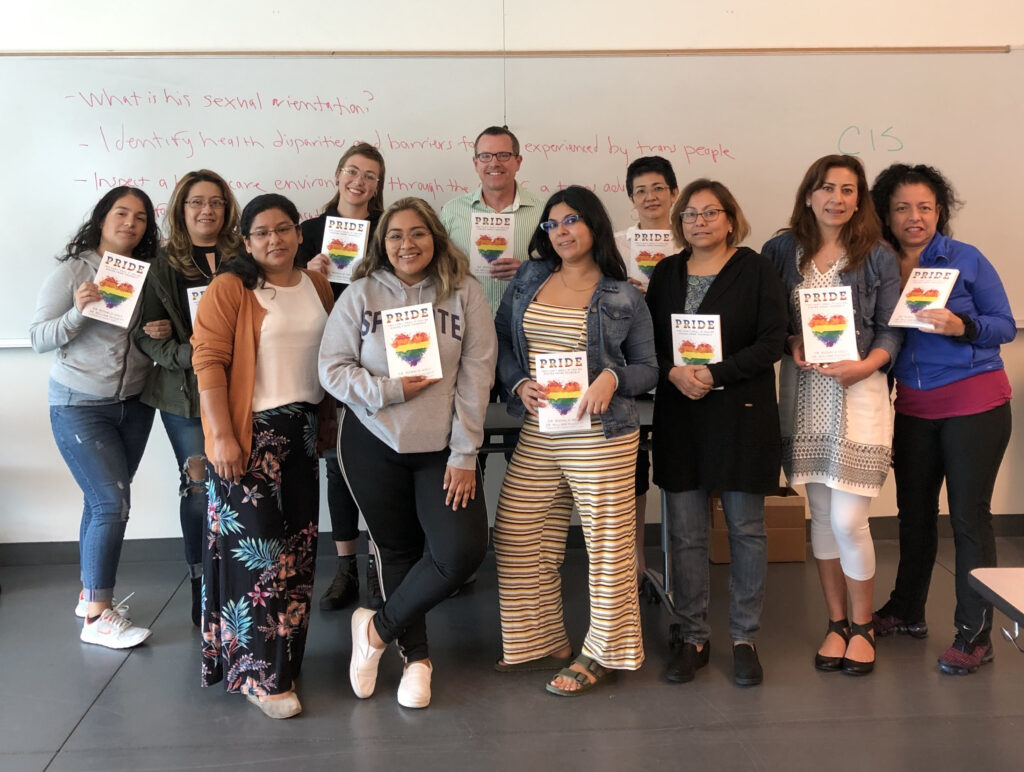
LGBTQ Medical Case Scenarios: An Experiential Learning Perspective
The presentation consisted of reviewing LGBTQ medical case scenarios through the lens of City College of San Francisco medical interpreter students. The class divided into small breakout groups, which allowed an experiential learning perspective. After discussing a particular case as a smaller group, the group would present the case to the whole audience with Dr. Holt as the facilitator.
The audience consisted of medical interpretor students. Signed copies of the book PRIDE were distributed compliments of Dr. Holt.
Audience feedback/impact of this presentation:
Great presentation. A lot of information that gets you thinking and understanding the LGBTQ community. Everything was important to me – especially in the last case about the person who didn’t want a pap because identified as male and had unwanted sex organ. Learned how to handle that and that this can happen.
Very informative, interactive activity. Thank you! Learned how to treat each other when encountering different sexual orientation or gender – Role playing helped a lot.
This is a great opportunity to learn and be in touch with the LGBTQ community. I learned the comfortable way to talk to the person when they confess that they are gay/lesbian. Thank you very much for sharing your stories and giving us valuable information. It was my first time of hearing it and gained a lot.
It was a great session and helped me to have a better understanding. LGBT – deserve to be treated with respect. I cannot imagine all the struggles LGBT people have to face in society in order to be accepted.
Dr. Holt – you have done a thorough job at explaining and breaking down LGBTQ. Thank you. This country is lucky to have you share, spread, and help everyone who struggles with gender identity. I learned the differences between the following: sexual orientation (who we’re attracted to), gender (how society constructs what is M or F), gender dysphoria (gender distress), genderqueer, and pansexual (attraction to soul). I have more clarification on the terms associated with LGBTQ and hope to bring awareness to the youth that I work with in my efforts to specialize in mental health.
It was a great case. It really made my group talk about it and think about the benefit/consequences. I learned that it is important to always explain how much you care for the person who is coming out to you as gay, lesbian, bisexual, or transgender. And say that if they need to talk about anything, you are going to be there for them and your relationship won’t change. It’s important to say the right words for someone who just said something confidential.
Great talk! Very informative. Never assume someone’s sexual orientation regardless what their sexual behavior is. I will be mindful and supportive. Never assume. Make everyone feel safe and welcome.
Jose on the DL – for me I’m still learning about the continuation in sexual orientations – especially how people identify and talk about fluidity. I learned that people can consider themselves as straight and still have sex with men and women. That coming out is a process, not a singular event, and it depends on the readiness of the person. Compassion is key. I will ask open ended questions and be compassionate as people are vulnerable in the process of coming out due to the mental and emotional distress it may cause.
Great scenarios. Lots of information – much of it new. I learned sexual orientation is combo of genes, male birth order, hormone and epigenetics; and how to help support someone who is struggling with their orientation – even if I don’t agree or understand it. I can make an impact on that person’s life (perhaps saving them from trauma, suffering, or saving their life).
Thank you so much for sharing your history with us. I really appreciated. As a mom I learned how important it is to be open minded and respectful with others sexuality.